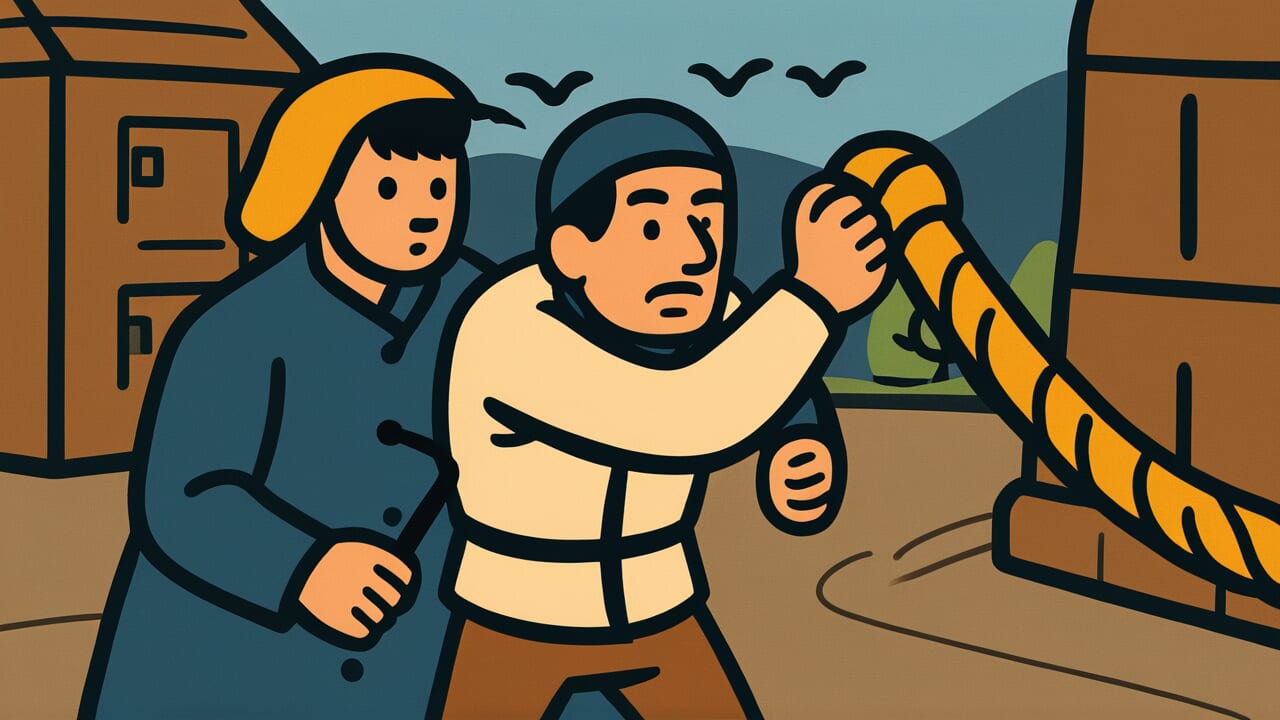How to Read “A thief resents the rope”
Dorobō ga nawa wo uramu
Meaning of “A thief resents the rope”
“A thief resents the rope” means blaming others or tools for the consequences of your own wrongdoing.
Instead of reflecting on your actions, you direct anger at completely unrelated targets. This proverb criticizes such unreasonable attitudes.
This saying is used when someone who did something wrong shifts responsibility. For example, someone breaks a rule, gets called out, and then resents the person who corrected them.
It points out the attitude of refusing to admit fault and blaming tools, circumstances, or other people instead.
Even in modern society, many people look for causes of failure outside themselves.
This proverb teaches us how misguided and embarrassing such attitudes are. It remains relevant today as a reminder of personal responsibility.
Origin and Etymology
This proverb likely comes from the punishment system of the Edo period.
Back then, criminals caught for theft were bound with rope and taken to the magistrate’s office. This rope was called “torinawa” and served as a tool to restrain criminals.
The saying expresses a twisted psychological state. Instead of feeling ashamed of committing a crime, the thief directs resentment toward the rope that binds him.
Thieves appear in this proverb because theft was one of the most common crimes in Edo-period Japan.
What’s interesting is that this proverb evolved beyond describing criminal psychology. It became a saying about broader human nature.
The tendency to shift responsibility for consequences to external factors isn’t limited to criminals. Anyone can fall into this pattern.
People in the Edo period saw through human weakness by observing the concrete scene of a criminal resenting rope.
This proverb captures the universal psychology of self-justification in just seven characters. It shows the sharp observational skills of our ancestors.
Usage Examples
- He got suspended for cheating, but complains the teacher is too strict. That’s exactly “a thief resents the rope.”
- Causing an accident through your own carelessness and then insisting the road was bad is like “a thief resents the rope.”
Universal Wisdom
“A thief resents the rope” sharply points out a distorted form of human self-defense instinct.
Why can’t people admit their mistakes? Because admitting fault feels like denying your own worth.
Psychologically, a defense mechanism kicks in to protect wounded self-esteem by justifying your actions.
But directing blame outward makes you turn away from lessons you should learn. Resenting the rope doesn’t change the fact that you’re a thief.
Instead, you pile on a new mistake: shifting responsibility.
This proverb has been passed down through generations because this psychology is timeless.
From ancient times to today, people feel the urge to blame others or circumstances first when they fail. This is human weakness and also the biggest barrier to growth.
Our ancestors saw through this human nature and left it as a warning.
The courage to honestly accept the results of your actions is true strength. It’s the first step toward growth.
This proverb conveys this strict yet warm life wisdom.
When AI Hears This
The human brain experiences strong stress when holding contradictory information simultaneously.
Psychologist Festinger named this cognitive dissonance. A thief resenting the rope is exactly the brain’s automatic defense mechanism to resolve this dissonance.
Two perceptions collide in the thief’s brain. One is the self-image “I am a smart person.”
The other is the humiliating reality “I got caught and tied with rope.” This contradiction is psychologically unbearable.
The brain has three solutions: change behavior, change perception, or shift responsibility externally.
But after being caught, behavior can’t be changed. Admitting the crime would shatter the self-image.
The only remaining option is attacking external factors: “The rope hurts” or “The way they tied it is terrible.”
What’s interesting is how fast this psychological mechanism activates. Research shows dissonance resolution begins in mere seconds, before conscious thought.
The thief himself doesn’t realize “why he resents the rope.” The brain automatically resolves the contradiction, and he genuinely feels angry at the rope.
Modern complainers and people who explode on social media share the same structure.
Admitting fault would damage their self-image, so the brain automatically redirects blame toward store clerks or others.
This isn’t a moral issue but a characteristic of the cognitive system built into the human brain.
Lessons for Today
This proverb teaches you the importance of courage to face failure.
With social media everywhere today, admitting fault may be harder than ever. Blaming someone else brings temporary relief. But nothing changes that way.
What matters is calmly examining what caused the result.
When you make a mistake at work, blaming the system or coworkers is easy. But was there really nothing you could have done?
When you get a bad test score, before saying the questions were too hard, reflect on whether your preparation was sufficient.
Accepting responsibility doesn’t mean denying yourself. Rather, it means gaining a chance to grow.
As long as you resent the rope, you remain a thief. But if you examine your actions, a new path opens.
You have the power to learn from failure.
Instead of blaming others or circumstances, become someone who thinks “What should I do next time?”
That attitude is what makes you truly strong.


Comments